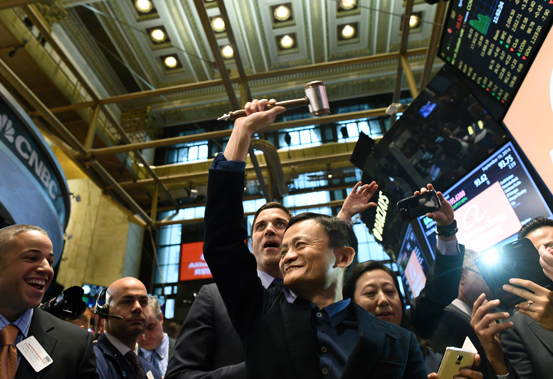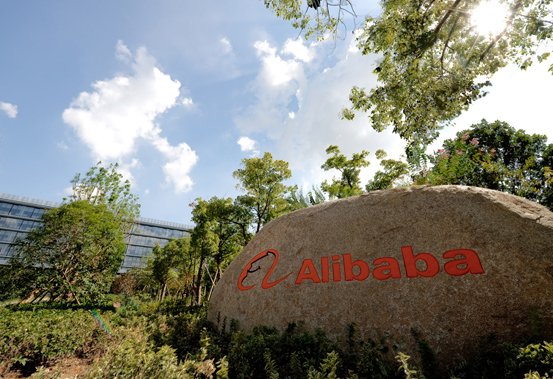This was a big bang by any measure. An Initial Public Offering (IPO) which broke all records, shares soaring 38 percent on their debut, and US$21 billion raised. After its IPO, with a market value of US$220 billion, Alibaba was worth more than Facebook, Amazon or eBay. The figures are mind numbing. But what is the wider significance of the Alibaba IPO?
"Listing in the US can be seen as a sign of confidence as the company has stood the scrutiny of western standards of corporate governance, accounting and auditing," says Professor Yin-wong Cheung, Hung Hing Ying Chair Professor of International Economics, and Head of the Department of Economics and Finance, at City University of Hong Kong.
The launch comes against a background of gradual financial and regulatory convergence between China and the rest of the world. "The China financial sector is complicated, and still relatively underdeveloped," adds Professor Cheung. "But you cannot change things at the snap of your fingers. Look at the European Union's effort to equalise banking and tax regulations. That is taking quite a few years to work through."
Mr Jack Ma, Executive Chairman of Alibaba Group, at the New York Stock Exchange
E-everything
For Professor Yue Ma, Chair Professor of Finance, in the Department of Economics and Finance, City University of Hong Kong, it is the scope of Alibaba's activity that makes it special.
"This IPO leads the way for setting up a business model for the next generation. The reach of Alibaba makes it special – ecommerce, ebanking, eFinance, eRiskmanagement, eInsurance, eEntrepreneurship, all using big data analytics."
"It is also part of a wider alignment of financial cultures between China and the rest of the world," explains Professor Ma. "According to the World Trade Organization (WTO) agreement signed in 2001, all WTO members will have to recognize China as 'a market economy' after 15 years. This implies that in a couple of years China will be more integrated with the global markets. There will be more foreign competition inside China, and correspondingly there will be more China investment globally. So the Alibaba launch is very much part of this expansion process."
The IPO comes against a background of China trying to liberalise capital accounts and get more companies to set up overseas. Due to this IPO success, and the fact that Alibaba is engaged in mergers and acquisitions in the US, it is likely that more companies will want to follow suit.
China companies are also set to take more of a leadership role in innovation and this may have implications as to where they list.
"As intellectual property protection remains weak in China, and as China companies become more innovative, they may prefer to invest more in the US to get good legal protection for their products," says Professor Ma.
China Tech - A Second Look
Confirmation of the landmark significance of Alibaba comes also from the financial community.
"With the success of this IPO, people are now looking more closely at China companies."
"With the success of this IPO, people are now looking more closely at China companies," says Dr Alan Song, Managing Partner of SB China Venture Capital who has worked with Alibaba and Taobao in earlier fund raising initiatives.
"It's a good example, and it's been audited by international accountants. Of course some mainland companies have had accounting issues. But now people will be looking more closely at China technology companies and thinking that there could be gold in there."
Closer weave of the financial fabric
The Alibaba IPO is part of an ever-closer weaving of the financial fabric.
"The trend is towards greater China engagement in multi-level global issues," says Dr Reuben Mondejar, Associate Professor in the Department of Management, City University of Hong Kong.
"This is a long term process. We can trace it back to at least 2001 when China joined the WTO. That triggered China companies starting to work with greater transparency, for example banks working through due process with risk analysis," says Dr Mondejar.
Intense scrutiny
In the months leading up to its IPO, Alibaba underwent an intense scrutiny by the US Securities Exchange Commission (SEC) which styles itself as 'the investor's advocate.' The filing process, from initial registration to issue of prospectus took more than four months. In response to comments and concerns raised by the SEC, the initial Registration Statement was amended no less than seven times. And in the final Alibaba Prospectus there were 44 pages of risk disclosures – twice as many as in the Facebook IPO – so the investing public has certainly been forewarned of potential downside.
Still, concerns persist about the very basis of Alibaba's listing as a Variable Interest Entity (VIE). Alibaba is best known as a mainland e-commerce giant, but the Alibaba Group Holding Ltd that is listed in the US is incorporated in the Cayman Islands. Under the VIE structure, the holding company has contractual rights to the profits of Alibaba China, but no economic interest in the assets of the mainland company. The VIE arrangement is not new, with over 200 listed Chinese companies taking advantage of it in the US. What is new is the scale of the Alibaba IPO, and what this signals is that the SEC, and along with it the American investing public, are now sufficiently confident in the arrangement to invest in quantity.
"We have to consider how countries understand one another. As part of a broad spectrum, IPOs have an important role to play. So does the negotiation involved in being a member of international organisations such as the WTO. And on another level just ten years ago the idea of people from China joining the Forbes list would have been unthinkable – look at the situation now!" comments Dr Mondejar.
Alibaba Group's corporate campus in Hangzhou, China
An epochal event
To take a broad historical sweep over the last five hundred years, Dr Mondejar considers the 19th century industrial revolution and the current tech revolution to be on a par as events of truly epochal proportions. And the Alibaba launch is pivotal to the momentum of China's role in this second revolution.
Has Jack Ma captured the zeitgeist for the younger China entrepreneurs?
"Alibaba is new to the new world but it's been around for 15 years in China, so it is not new here," says Dr Mondejar.
"But as opportunities in the US and Europe have fallen away, we are seeing 30% of the Chinese educated abroad returning home. That figure was just 10% a few years back. So we will likely see many more Jack Ma's starting up in China."
What the effect of so many talented people returning to these shores may be, only history will tell. One thing seems certain: the Alibaba IPO is kick-starting something big.


